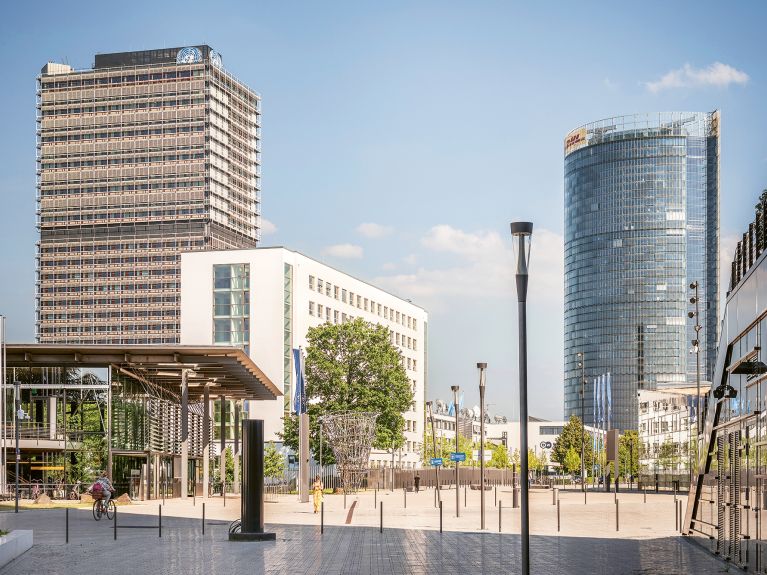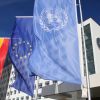UN City Bonn: centre of sustainability
The city on the Rhine has developed a profile as a centre of global dialogue. Twenty UN institutions are based here.

Viewed from below, Langer Eugen – or “Tall Eugene” in English – appears even more impressive than it already is. 115 metres of steel, glass and wood present a strong symbol, an architectural exclamation mark on the bank of the Rhine in Bonn’s former Bundestag district. When you pass the security checks and walk the short distance down towards the high-rise tower, you immediately sense the special charm of this place. Once, while it still contained the offices of members of the German Bundestag, signals emanated from this building for the whole country. Now, 20 years after the Federal Government’s move to Berlin, messages are developed here for the whole world. Instead of only one nation, today (almost) all nations work here to make the earth a much better place. Twenty four United Nations institutions have settled in Bonn and form the core of a synergetic network: surrounded by federal authorities and ministries, international governmental and non-governmental organisations, research institutes and globally active business enterprises, UN employees are putting all their energies into implementing the 17 objectives formulated in the 2030 Agenda for Sustainable Development, the so-called Sustainable Development Goals (SDGs).
Dieses YouTube-Video kann in einem neuen Tab abgespielt werden
YouTube öffnenThird party content
We use YouTube to embed content that may collect data about your activity. Please review the details and accept the service to see this content.
Open consent formThese goals are also being pursued by the Bonn-based headquarters of the UN Secretariat of the Convention to Combat Desertification (UNCCD) and the UN Volunteers (UNV) programme, as well as the offices of several species protection conventions. The Global Festival of Action, which organises the SDG Action Campaign every year at the World Conference Center in Bonn, demonstrates the dynamism and enthusiasm with which people from all over the world are addressing this challenge for the future. The 2017 Climate Change Conference (COP23) at the headquarters of the UN Climate Change Secretariat in Bonn was the largest intergovernmental conference ever held in Germany.
Bonn is the German competence centre for international policy and global sustainability strategies.
With the “Bonn Convention”, a UN agency, the Secretariat of the Convention for the Conservation of Migratory Species of Wild Animal, moved into Bonn headquarters for the first time in 1984. A decade later, the “Berlin/Bonn Law” laid down the role of the Federal City as a location for development policy and international institutions, and on 20 June 1996, in front of Carstanjen House and in the presence of the then UN Secretary General Boutros Ghali, the then Environment Minister and the present Chancellor Angela Merkel, a ceremony hoisted the UN flag. The federal government had officially given the small castle directly on the Rhine as an office building to the United Nations, which settled further secretariats and institutions there and thus made Bonn an official UN city. Since then, the agency has developed into a global player in climate protection and sustainability issues. The Secretariat of the UN Framework Convention on Climate Change (UNFCCC) is the largest UN agency in Bonn, with around 500 employees, and is charged with promoting the worldwide implementation of the Paris Agreement. “The United Nations has long been an integral part of our city and underscores the international character and cosmopolitanism that have marked Bonn for decades”, emphasizes Mayor Katja Dörner. “I’m particularly pleased that all the institutions are dealing with the topic of sustainability, the topic of the future par excellence.”
Dieses YouTube-Video kann in einem neuen Tab abgespielt werden
YouTube öffnenThird party content
We use YouTube to embed content that may collect data about your activity. Please review the details and accept the service to see this content.
Open consent formSearch for global answers
Bonn does indeed have a lot to offer. Situated directly on the Rhine roughly 30 kilometres south of Cologne, it is bordered on one side by the Siebengebirge hills and on the other by the foothills of the Eifel mountains. With some 330,000 inhabitants, Beethoven’s birthplace may not be a major metropolis, but at the same time it is large enough to offer a varied cultural life.
The United Nations has long been an integral part of our city.
Bonn advertises itself with the slogan "Sustainable Bonn", supports “climate ambassadors”, is active in the international network Fair Trade Town and is one of four "Network Sustainability Points" in Germany. Bonn exploits the locational advantage offered by the presence of the UN and the Federal Agency for Nature Conservation and the Society for International Cooperation (GIZ). The same applies to the University of Bonn, one of the most important institutions in the city, with 34,000 students; for instance, the “Geography of Environmental Risk and Human Security” course enables the world’s first joint master’s degree between a university and the UN University. In addition, the UN University has joined forces with the Bonn-Rhein-Sieg University of Applied Sciences and other institutions in the city to form the “Bonn Alliance for Sustainability Research”.
You would like to receive regular information about Germany? Subscribe here:




